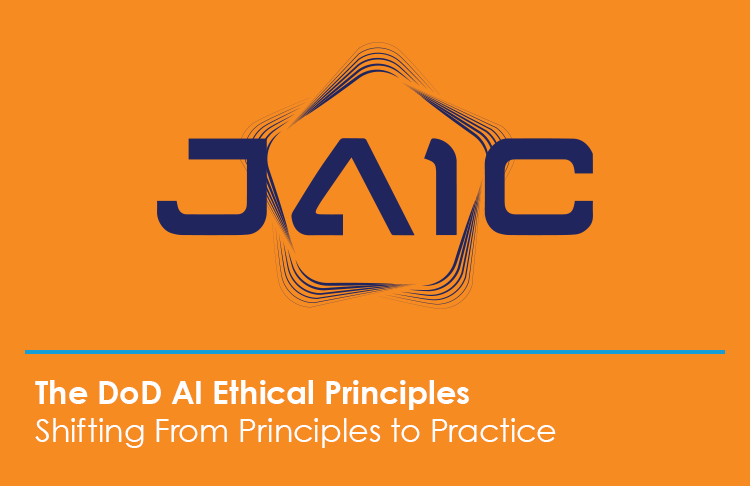The DoD AI Ethical Principles -
Shifting From Principles to Practice
- By: JAIC

“Creating the principles is the easy part. It’s the implementation part that is the hard part.”
- Lt. Gen. Jack Shanahan, JAIC Director
A little over one month ago, the Secretary of Defense adopted AI Ethical Principles for the Department of Defense. As the DoD adopts AI technology from back-office functions to battlefield operations, there is a recognition that despite the benefits AI brings, there is also a risk of unintended consequences or harms. We have a moral imperative to mitigate the potential resulting harm. As such, the DoD’s adoption of AI Ethical Principles reaffirms a “commitment to upholding the highest ethical standards” and “responsible and lawful behavior.” And while the adoption of the principles may be new to the DoD, DoD ethical principles are grounded in the deep history of the value-based framework of the organization and the existing legal framework of the Law of War.
As General Shanahan, the director of the JAIC stated, in a recent press briefing, “creating the principles is the easy part. It’s the implementation part that is the hard part.” And that statement holds true not with just the DoD, but with every organization on this journey of adopting AI, ranging from small organizations to the big tech companies.
In the last month, the JAIC has been leading DoD’s conversation in shifting these principles to practice and implementation. Specifically, we are:
- Establishing a DoD-wide Responsible AI Subcommittee. The subcommittee is part of a boarder DoD AI Working Group and is an interdisciplinary group of individuals representing all of the major components of the DoD. These include each of the Services and the Joint Staff, DARPA, and from OSD, Research & Engineering, Testing & Evaluation, Acquisition & Sustainment, Policy, and the Office of the General Counsel. This subcommittee kicked-off in early March and has already met twice. This group is tasked to inform the development of a more detailed DoD policy document, which will lay out an ethical and legal framework mapping the DoD AI Principles to the AI product life cycle and acquisition process, as well considering risk analyses, governance structure, and more. As the subcommittee develops its work product, external subject matter experts will be engaged in the process.
- Using the JAIC’s Acquisition & Sustainment process to engage how our partners design, develop, and deploy technologies for the DoD. In early March, the JAIC issued its first RFP, Joint Warfighting National Mission Initiative, which included the DoD AI Ethical Principles as ‘Applicable Standards’ under the Performance Work Statement Section. Respondents are to provide documentation on “how the development of [their] product considered and achieved/mitigated the issues raised within the … AI Ethics Principles.” While this is just an initial step, we look to engage our industry partners and other stakeholders specifically in the acquisition process to more broadly determine what it means to operationalize these principles as well as define corresponding evaluation criteria.
- Piloting a “Responsible AI Champions” cohort within the JAIC. This inaugural cohort is a cross-functional group of individuals embedded within strategic areas representing the AI product lifecycle, such as product (design & development), testing & evaluation/verification & validation, and acquisition teams. These individuals will receive training on AI and the DoD AI Ethical Principles with a focus on the application of the principles throughout the AI product lifecycle as well as operationally on and off the field. The intent is for these individuals to return to their respective work areas and champion implementation practices and processes that embody the DoD principles. In addition, they will act as the organization’s eyes and ears on the ground to identify new implementation opportunities as well as escalate any concerns. As the Champions advise, educate, and inform their immediate team members, it will create muscle memory for all team members to initiate and engage in a broader dialogue around the principles and the technology.
These are just some examples of how we are operationalizing the DoD AI Ethical Principles. There are many other efforts currently occurring that also contribute to building out our broader DoD AI ethics ecosystem, from developing data cards, to creating a Data Governance Council to collaborating with other U.S. Government agencies and our Allies. As we go forward, we will further engage a broader and diverse group of stakeholders to help inform our efforts.
We are excited to embark on this journey and recognize that there will be iterations and pivots along the way, as to be expected with any new endeavor. The DoD’s commitment to implementation of its AI Ethical Principles is steadfast and the passion and energy of the individuals working on this from all areas across the DoD is inspiring!